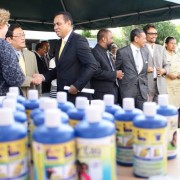Over the past few years, the increase in the use of modern contraceptives in Madagascar has slowed down. Enabling couples to determine whether, when and how often to have children is vital to safe motherhood and healthy families. Increasing access to family planning results in profound health, economic and social benefits, and could prevent up to 30 percent of maternal deaths that occur every year.
The United States government, through the U.S. Agency for International Development (USAID), will contribute $2.2 million to support the efforts of the government of Madagascar to eradicate polio in the country. Over 4.3 million Malagasy children under the age of five will directly benefit from this support.
The United States government is pleased this World Malaria Day to note the dramatic progress that has been made over the past decade to reduce the burden of malaria in sub-Saharan Africa. According to the World Health Organization, the scale-up of malaria control interventions resulted in an estimated 4.3 million fewer malaria deaths globally since 2000.
The U.S. Ambassador to Madagascar, Robert Yamate, together with Minister of water, hygiene and sanitation, Johanita Ndahimananjara, USAID Mission Director Susan Sawhill Riley and UNICEF Country Representative Elke Wisch, marked World Water Day on Wednesday March 18th in the Atsimo Andrefana region, in southwestern Madagascar, by inaugurating a new water supply system.

In response to an urgent request made by the Government of Madagascar, the U.S. Government provided emergency assistance for the flood victims in Antananarivo on Thursday, March 12, 2015.








![Cover: Paradise Lost? Lessons from 25 years of environment programs in Madagascar - Click to read publication [PDF, 3MB] Cover: Paradise Lost? Lessons from 25 years of environment programs in Madagascar](https://2012-2017.usaid.gov/sites/default/files/styles/732_width/public/nodeimage/paradise_lost_0.jpg?itok=klue3vb3)
Comment
Make a general inquiry or suggest an improvement.